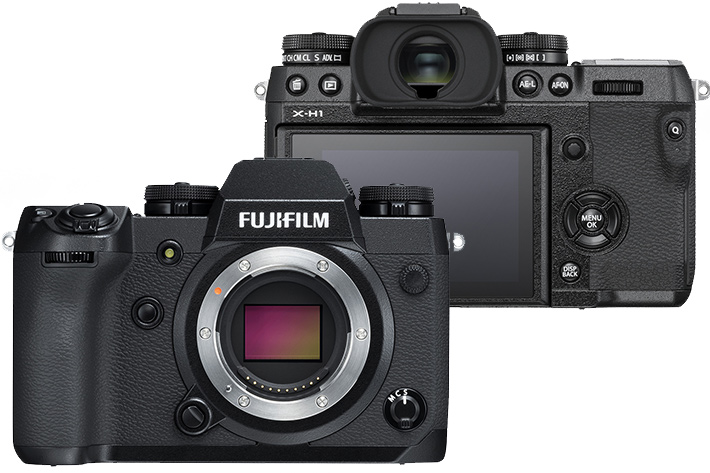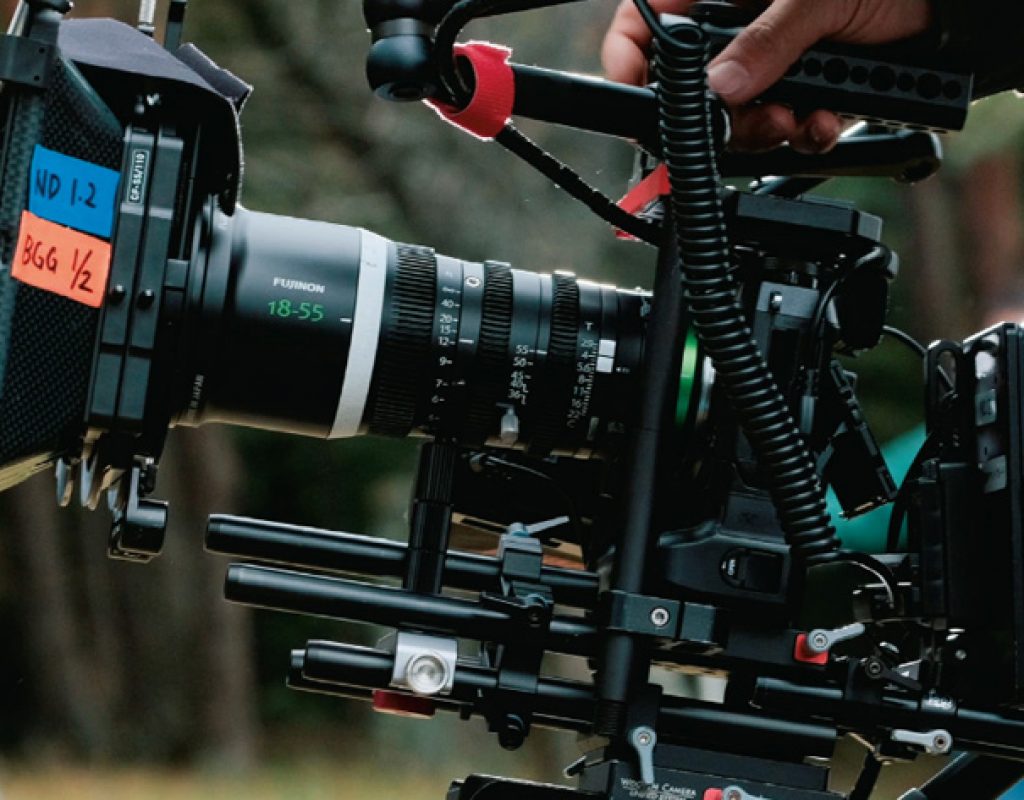
Announced as the highest performance camera in the X family, the Fujifilm X-H1 may be seen as a step towards the segment of the market where the Panasonic GH5 sits. Is there a war about to start?
The rumors from the last weeks are confirmed, and the web is now full with information and comments about the new camera from Fujifilm, which represents a step forward for Fujifilm users aspiring for more video options, and may even entice potential buyers to look at this DSLR-like body – yes, it’s a mirrorless but looks more and more like a DSLR – which features the most complete list of video features a X series camera offers.
https://youtu.be/4AofDYo-tw8
Fujifilm is, no doubt, moving into the video segment, a move that makes sense, as the company has the experience of serious cinematography – look at the lenses they produce – and is now in a position to expand the moving images option in their APS-C cameras. For some, this new camera represents a move into Panasonic GH5-GH5s territory, so the discussion about the advantages and problems of each model will be theme for inumerous conversations on the web. One thing is sure: Fujifilm wants this model to be regarded as a camera offering professional video capabilities.
The new X-H1 is the first to feature in-body image stabilization (IBIS), a new Flicker Reduction mode that allows for stable exposure under fluorescent and mercury lighting, DCI 4K and other impressive video capabilities. The presence of IBIS is already pointed by some as an advantage when compared with the Panasonic GH5s, but any discussion over this theme has to take into consideration the reasons Panasonic pointed to remove IBIS from the GH5s: the technology does seem to have problems with cameras mounted in gimbals, something the GH5s was designed for.
https://youtu.be/DEqgq1boB94
Let’s leave that discussion for others, and center here on the features that make the Fujifilm X-H1 an interesting camera for video. While it may not be important to some, the X-H1 is the first camera in the X Series to include ETERNA, a new film simulation mode that is ideal for shooting movies. Those familiar with Fujifilm’s film simulation – which works fantastically, as I had a chance to try – will probably be happy with this new addition. This mode simulates cinematic film, creating understated colors and rich shadow tones, greatly enhancing creative freedom during post-processing.
In terms of video image quality, the X-H1 boasts many functional and performance improvements, including the 1080/120P high-speed video mode (1/2, 1/4 and 1/5 speed slow motion) for recording spectacular slow-motion footage; F-log SD card recording which aids smooth workflow; a DCI 4K shooting mode (4096×2160); a 400% dynamic range setting (approximately 12 stops); 200 Mbps high bit rate recording; a high-sound quality internal microphone (24 bit/48 kHz); and verbal time codes.
https://youtu.be/jUcKd8HNqvc
Movie recording, using a card with the UHS Speed Class 3 or higher, offers the following options:
- [4K (4096×2160)] 24P / 23.98P up to approx. 15min.
- [4K (3840×2160)] 29.97P / 25P / 24P / 23.98P up to approx. 15min.
- [Full HD (1920×1080)] 59.94P / 50P / 29.97P / 25P / 24P / 23.98P up to approx. 20min.
- [HD (1280×720)] 59.94P / 50P / 29.97P / 25P / 24P / 23.98P up to approx. 30min.
The Vertical Power Booster Grip VPB-XH1, which can be added to the camera, is not just something photographers will appreciate, is also a tool videographers will love, because it increases the maximum period for shooting movies in 4K to about 30 minutes. Fujifilm has done this before: by moving the batteries away from the body, as the grip receives two additional batteries, the video capture time at high-resolution is expanded. The Vertical Power Booster Grip features a shutter release button, focus lever, AE-L button, AF-ON button, command dial, Q button, and Fn button, providing the same ease of operation when using the camera in vertical or horizontal positions. The grip is equipped with a headphone socket to allow monitoring sound while recording, and includes recharging capability.
https://youtu.be/28VHgM_HdYY
The new camera is built around a 24.3 megapixel APS-C sized X-Trans CMOS III sensor and X-Processor Pro image processing engine. The X-H1 boasts a newly designed, robust and durable body, with dust and water-resistant properties and ability to operate in temperatures as low as 14°F \ -10°C. The X-H1 also features 25% thicker magnesium alloy than the X-T2. The camera also features a high quality, scratch-resistant coating and a compact, lightweight body that maintains high precision and strong resistance to impact shock torsion and other sources of deformation.
The camera offers a range of features that support shooting in various situations by professional and experienced amateur photographers, and videographers. When used in combination with FUJINON lenses and Fujifilm’s signature color reproduction technology, the X-H1 produces outstanding image quality and video reproduction.
“The new X-H1 is our first X Series model to feature in-body image stabilization, and we are very excited to introduce this camera to the market,” said Yuji Igarashi, General Manager of the Electronic Imaging Division & Optical Devices Division at FUJIFILM North America Corporation. “In addition to ensuring outstanding image quality, the X-H1 is fully equipped with an array of features and functionality specifically designed to enhance creative expression in a wide range of settings.”
https://youtu.be/_dIaD7lnaDw
In-body image stabilization, able to reach 5.5 stops, makes its debut in the X family through this camera. Three axial accelerometers, three axial Gyro sensors, and a specially-developed dual-processor to achieve approximately 10,000 calculations per second make the magic. When combined with compensating mechanisms, the X-H1 produces uncompromised image quality and precision. 5-axis image stabilization is possible with all XF and XC lenses, with certain lenses capable of up to a maximum of 5.5 stops. In addition, a new spring mechanism has been added to reduce micro-vibrations caused by operation of the mechanical shutter. Photographers may also choose to use the electronic front curtain shutter or the electronic shutter, virtually eliminating the effect of vibrations to maximize the benefits of image stabilization.
The new X-H1 features a high-magnification and high-precision electronic viewfinder with a magnification ratio of 0.75 times and 3.69 million dot resolution, leading the class for APS-C mirrorless cameras. The viewfinder display is extraordinarily smooth, with a display time lag of just 0.005 seconds and a frame rate of 100 frames per second, allowing the user to instantly confirm the movement of the subject and position the focus with great precision. The X-H1 also features a 3-direction tilt, 3-inch, 1.04 million dot electrostatic touch-panel LCD, which can be intuitively set to the desired angle. In addition, the 1.28 inch sub-LCD on the top of the camera, which emulates the design of the mirrorless medium format GFX 50S, allows for instant confirmation of shooting information.
https://youtu.be/kRUl1xD3EqQ
The X-H1 incorporates additional improvements based on feedback from professional photographers, including a large grip design, leaf-spring switch for the shutter-release button, near-silent shutter sound, a new focus level, and a new AF-ON button and enlargements of buttons on the rear of the camera.
The Fujifilm X-H1 has two lenses for professional video shooting: the FUJINON MKX18-55mmT2.9 and MKX 50-135mmT2.9, which are the first full manual cinema lenses to be compatible with the X Series interchangeable lenses. In the 35mm format equivalent, MKX18-55mm covers a focal distance from 27mm to 84mm and MKX50-135mm covers a focal distance from 76mm to 206mm. Combined with X Series’ unique color reproduction technology, MKX lenses further broaden the expression for professional video shooting.
The X-H1 will be available on March 1, 2018 in the U.S. and Canada. The X-H1 Body will be available for USD $1,899.95 and CAD $2,449.99 and the X-H1 Body with Vertical Power Booster Grip Kit will be available for USD $2,199.95 and CAD $2,799.99.


